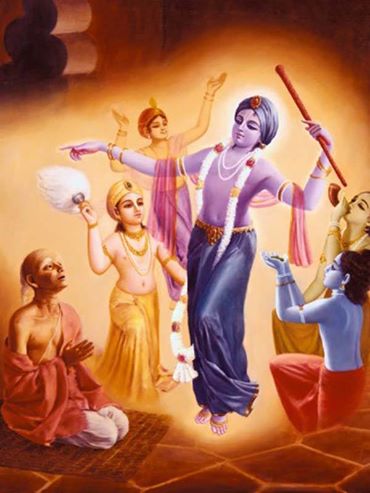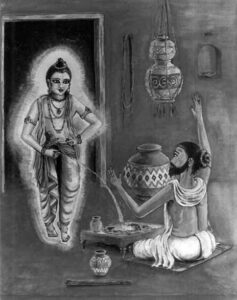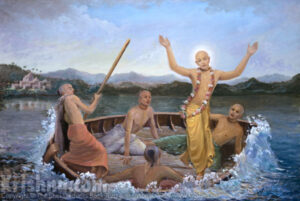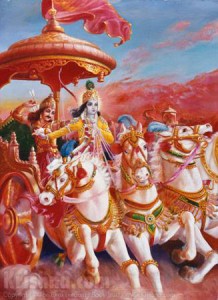n the holy village of Ekachakra, there lived a Brahmana family. The father, Hadaya Pundit, and the mother, Padmavati, were blessed with a son named Nityananda. This child was none other than Lord Nityananda, who was full of divine charm and possessed extraordinary features that captivated everyone.
From an early age, Nityananda exhibited a natural inclination towards spiritual activities. He found immense joy in enacting the pastimes of the Supreme Personality of Godhead with his friends. Every day, they would gather and perform dramas depicting the divine pastimes of Lord Krishna and His various incarnations.
Enacting Divine Pastimes
In their games, one friend would play the role of Bhumi (Mother Earth) in the form of a cow, while another would act as Lord Brahma. Together, they would approach the ocean of milk and plead for relief from the demons posing as kings. Another friend, playing the role of Lord Vishnu, would assure them that He would soon incarnate as Lord Krishna to rid the world of its troubles.
The children would reenact scenes from Krishna’s life, such as the birth of Krishna, the slaying of demons like Putana, Aghasura, and Dhenukasura, and the playful adventures of Krishna and Balarama as cowherd boys. They even imitated Krishna and His friends breaking into houses to steal butter and yogurt, much to the delight and amusement of the villagers.
The Role of Lakshmana
Once, Nityananda played the role of Lakshmana, and a friend portrayed Ravana. In their enactment, Ravana threw a lotus flower, representing his powerful weapon, at Lakshmana. When the lotus flower touched Nityananda, He fell to the ground and lay motionless, as if unconscious. His friends, believing Him to be dead, began to cry.
Padmavati and Hadaya Pundit, Nityananda’s parents, rushed to the scene and were devastated to see their lifeless son. The entire village was engulfed in sorrow, unable to understand why a mere lotus flower had such an effect.
The Divine Remedy
Amidst the confusion, one of the onlookers recalled a previous play where Nityananda had fainted while enacting the role of Dasarath. In that instance, He had instructed His friends to call Hanuman to fetch the Gandhamadhana mountain if He ever fell unconscious. Remembering this, one of the children dressed as Hanuman and embarked on a mission to bring the mountain.
Overcoming obstacles posed by other friends acting as Rakshasas, the child playing Hanuman finally brought the mountain. Another friend, playing a physician, placed the mountain near Nityananda’s nose, and miraculously, He stood up, fully revived. The villagers rejoiced, embracing Him with love and relief.
Moral of the Story
The divine pastimes of Lord Nityananda illustrate His boundless devotion and playful nature. Even as a child, He exhibited the qualities of a great devotee, inspiring those around Him with His divine acts. His childhood stories remind us of the importance of devotion, compassion, and the joy of engaging in the service of the Supreme Lord.
Conclusion
Lord Nityananda’s life is a testament to the power of devotion and the joy of serving the Supreme Lord. His divine pastimes continue to inspire and uplift devotees, reminding them of the ultimate goal of life – to develop a loving relationship with Krishna and engage in His service.
Hare Krishna, Hare Krishna, Krishna Krishna, Hare Hare Hare Rama, Hare Rama, Rama Rama, Hare Hare.
PS: I humbly request all devotees to share this moral and instructive story to benefit everyone by hearing about Krishna and His dear devotees.



